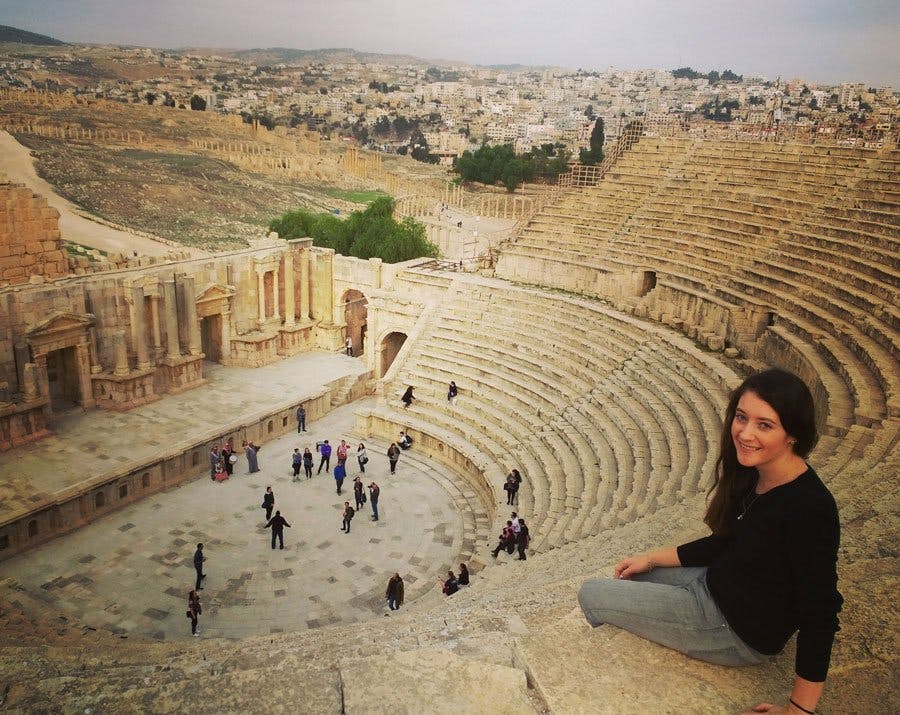SPU has had an astounding Fulbright acceptance rate.
If you want to make a global impact, a Fulbright Scholarship could help your career path. Fulbright alumni are presidents, prime ministers, and Nobel and Pulitzer Prize winners. And Seattle Pacific students have a good track record of winning the award.

The Fulbright Program is a highly competitive, federally funded grant for students and recent graduates to conduct research or teach English in a foreign country for one year. This year, Mariah Tien Olson ’23, who graduated magna cum laude with a major in Asian Studies and a minor in film studies and honors, was selected as a Fulbright Student for an English Teaching Assistantship to Zambia for 2023–24. In the 2018–19 award cycle, the program chose four SPU graduates to teach English abroad: David Dovgopoly ’15 in Ukraine, Rachel Long’18 in Kyrgyzstan, Abigail Jensen ’18 in Jordan, and Rachel Weeks ’16 in Laos.
Laos sounds like motorcycles, smells like car exhaust and green mango trees, and tastes like sticky rice, papaya salad, and sweet Lao coffee.
Four out of five SPU applicants were accepted in the 2018-19 cycle. To put that in perspective, most of the 14 universities awarded four scholarships in the 2017 to 2018 academic year submitted 20 applications.
SPU had an 80 percent success rate in the 2018-19 cycle due to the school’s commitment to a global outlook.
Rachel Weeks, a political science alumna who now works as an arbitration and government affairs analyst in Los Angeles, first heard about the scholarship in an international politics course.
She taught English at an engineering university in the Laos capital, Vientiane. Weeks said Laos sounded like motorcycles, smelled like car exhaust and green mango trees, and tasted like sticky rice, papaya salad, and sweet Lao coffee. Her classes had 40 engineering students, all at different levels of English — from learning the ABCs to holding conversations.
“This made complex language learning difficult,” she said. “However, I tried to remember my most important goal for being there was to build relationships with my students. I did the best job possible and accepted that while I cannot be a miracle teacher, I could be an encouraging influence.”

One of the ways she built relationships was by practicing the Lao language in front of her students and showing them that it was okay to make language mistakes.
“When I spoke Lao, it helped my students relax because they could see that I was also trying — and failing — to speak a new language,” she said, adding that her students were at first nervous to make language mistakes in front of a native English teacher.
“Fulbright clarified and confirmed my passion for international relations and public diplomacy,” she said. “I love how Fulbright commits to the mission of diplomacy through soft power influences and relationship building.”
Abigail Jensen applied for a Fulbright award because she wanted to improve her Arabic and return to Jordan where she interned as a translator in the summer of 2017. Jensen, who majored in global development and linguistics, co-taught English to first graders and then co-taught fifth graders in the capital city, Her Jordanian co-workers were like a family to her.
“We were always exchanging food and stories with each other,” she said. “Being around them was probably the one thing that has improved my Arabic the most.”

Jensen loved her church in Amman and the genuine excitement of Jordanian Christians.
“Those outside the church have lots of stereotypes about what Christians are like,” she said. “It was interesting to explain that just because someone is from a Western country does not automatically make them Christian.”
She introduced her fifth graders to the game of Taboo, which they affectionately call “tabbouleh” after the popular salad containing parsley, tomatoes, mint, and bulgur. For the game, one team would send a student to sit in front of the classroom with their back to the smartboard. Abigail would put a word on the PowerPoint and a teammate described the word in English. Abigail deducted a point if anyone was caught speaking Arabic.
“The fifth graders loved friendly competition,” she said. “This was a fun game to help them improve their speaking and review vocabulary words.”
“Those outside the church have lots of stereotypes about what Christians are like,” she said. “It was been interesting to explain that just because someone is from a Western country does not automatically make them Christian.”
Today, Jensen is a distribution center assistant at Seattle Union Gospel Mission.
“Fulbright enabled me to feel more independent traveling and living abroad,” she said. “I improved my Arabic, and I gained new skills and experiences through teaching.”
Weeks agrees that experience abroad is invaluable.
“I hope that every SPU student has the opportunity to study or live abroad,” Weeks said. “Going to an unfamiliar place gives you a perspective that is hard to have otherwise.”




